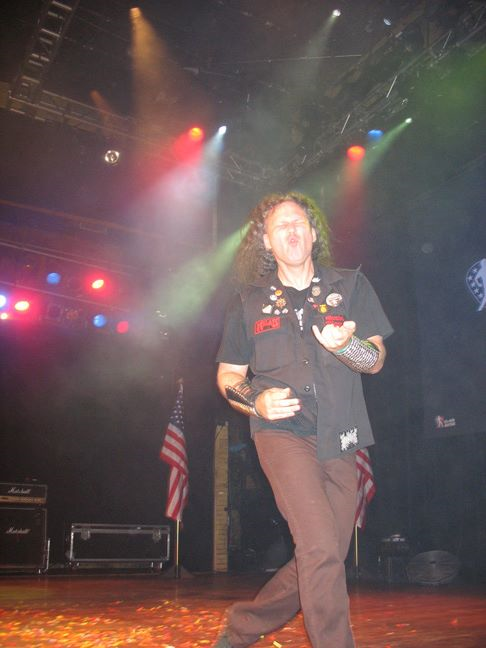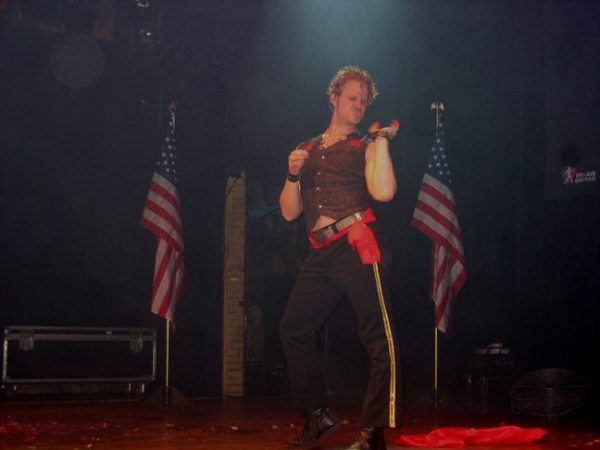The 2013 Air Guitar season has ended, and we are all (mostly) recovered. What better time, then, to reflect on the season that was? There were some big changes this year, and they affected the way the competitions shook out. Some of those changes are even going to affect next year's competitions. What is next year going to be like? And how did this year's performances set the tone for next time around?
Format Changes
It looks like the bracket format is here to stay, which is, like many things, complicated but mainly good. So next year, there will be yet another round of Qualifiers in various cities, put on by enthusiasts (generally, competitors or ex-competitors) with the blessing of USAG brass. Those qualifiers will feed into regional semi-finals, and those semi-finals into the national finals. That part is straightforward and everyone understands it. The interesting part comes in when you start looking at who, exactly, gets into which competition, and whether anything affects their entry. This is something we learned this year, and I don't know for certain, but it seemed pretty clear that a lot of it was being worked out as we went along. Not in the sense that competitions were a mess or that the organizers were unprepared - I'm not trying to talk smack here - but rather that there were some game-time decisions, some unforseen situations that had to be dealt with as they arose. And those may now be codified into "the rules."
So who gets in where?
Qualifiers are more about who cannot compete than who can. In a qualifier, any Joe Schmo can compete - unless they are the event's organizer or last year's winner. That was the rule this time around. How much of this was due to the past format? Last year, there were Regionals, rather than Qualifiers, and those were put on by the USAG organization rather than by locals. In the Regional setup, only the winner went on to the finals, rather than the top 2 going on to semis. The point of the change was to open up competition to new winners, rather than to have a city constantly won by the same person year after year (which was happening), and it worked. But what are the rules going to be next year - are both the #1 and #2 winners excluded? Or just the #1? Does that mean the past winner who dominated their city gets to come back and dominate once again? Or do they get a permanent bye to the semifinals? Surely not - but doesn't this open the door to the victory just alternating between 2 people every year? When one is excluded, the other wins, and vice versa. So this is the first thing to watch for next year.

Midnight Maniaxe, first-timer winner of the Chicago Qualifier, at Nationals
Semi-Finals are where things start to get complicated. They will include the top two air guitarists from the qualifiers in their area (or not really in their area... more on this later), however many that works out to be, the organizers of those qualifiers, the previous-year winners from the cities of those qualifiers, and... maybe other people. Each of these categories brings its own complications.
- Previous-year winners: we've just talked about this.
- Top two winners from qualifiers: this year, Kansas City fed into the Eastern Semi-Final in New York, because there were only 3 qualifiers in the actual geographic region (compare against 6 qualifiers feeding into the Western Semi-Final in San Francisco). Evening out the numbers leads to weird, stretchy definitions of a geographic region, but more to the point, it leads to travel budget problems. Boston air guitarists could jump on a Fung Wah bus (or equivalent; the actual Fung Wah line is currently shut down due to inspection issues) for $15, or drive down for the price of gas, but KC competitors had to fly in, and only the winner got a stipend to do so. Thunderball had to raise money online - as the second-place finisher, he had earned the right to compete in NYC, but wasn't awarded any money to get there.
- The way I see it, this means there are two problems. One, having a sensible layout strategy that won't cause an undue burden on competitors (for a really interesting look at the same problem in another grassroots sport that just did a big reorganization of its championships structure, check out this article on flat-track roller derby and this year's playoffs... if you're not a derby buff, scroll down to the part with the maps; similar stuff, right?) The second problem is that the rules for whether or not to pay the second-place air guitarist were never made clear, and the amount varied as well. That needs to be set in stone in time for next year.
- Organizers: For this group, it's not really a complication so much as a question. Who are they going to be? Are the people who hosted this year going to host again next year? Speaking for Team Boston, I can say it will probably be a repeat performance - Captain Airhab was, by all accounts, an awesome host, and I'm not just saying that because I'm married to him. But other places, who can say? I don't know if anyone had a bad time hosting per se, but maybe they wanted a chance to compete at the qualifier level. A pass to the semis is good if you feel comfortable competing at that level. I know I couldn't hold my own there, so for me to host would be a waste of everyone's time. Also, are some new locations going to open up - places where no one got a qualifier together this year? Philadelphia, looking at you. And Seattle. And what would that mean about the "last year's winners" if there was no last year there?
- And... other people: This year, USAG called in some other stars of air guitar in various regions so as both to fill in the semifinals rosters and to make sure these people didn't wind up out in the cold due to the vagaries of where qualifiers happened to take place (Philly, once again looking at you: Windhammer got into the semis despite not having had a qualifier in his town, because he had been the winner last year anyway). We also saw some people who had been workhorses of their hometown, like Filthy Fingers - a hidden gem of Boston air guitar - competing for years without glory, extended the invite. I approve heartily of this practice in that everyone gets to see your hometown heroes rock out, but it does make it confusing because if the dance card is already full with qualifier winners, organizers, etc., these same people might not be invited next year.
The Dark Horse is its own world of weird rules. Specifically, there are no criteria as to who gets in. Or, at least, we have no idea what those criteria are, other than you have to be pretty decent and not have made it to the national finals. There is a strong suspicion that whether or not you'll be in town - as in, are you travelling to the city where nationals and the Dark Horse are taking place - plays a role. There isn't a hard and fast score you have to have to make it in. It's subjective and it's in the eyes of USAG. This does get impacted by the new format since the bigwigs aren't at the local qualifiers. They only see you and know whether to invite you to the Dark Horse if you make the semi-finals, or if they see video of you, or hear word of mouth that you're great... or if they just know you and want to see you again.
 Van Dammage at Nationals - where he made it in after thinking he didn't, placing 4th in his semi-final
Van Dammage at Nationals - where he made it in after thinking he didn't, placing 4th in his semi-final
Nationals aren't really changing other than the mid-stream change this year of permitting the top 4 rather than top 3 from a semi-final to compete. It's awkward to say "The whole second round EXCEPT YOU will advance!" but it's for sound reasons of having enough slots for everyone plus dark horses. It was a bit awkward having that changed this year after 2 semi-finals had already taken place - so that meant telling two people that they actually DO need to buy a plane ticket, last-minute - but now that it's codified, I don't forsee it being a problem going forward. The only thing that's up in the air is whether the top 3 or top 5 dark horses get in, and that's probably a space/time problem (for instance, not every competitor who qualifies for the finals can actually make it - Weird Wallace couldn't go this year - so that opens up a bit more room in the roster).
Since this got so wordy, I'm actually going to split it out into another post to talk about predictions, hopes, and concerns for next year outside of the format change. AND I HAVE SOME.
Do you? Get at me in the comments!
